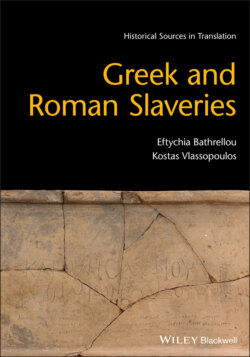Читать книгу Greek and Roman Slaveries - Eftychia Bathrellou - Страница 22
SOCIAL DEATH 1.11 Social Death and Roman Law
ОглавлениеCivil law was the law applying to Roman citizens; the law of nations refers to rules common to all human communities; natural law was law according to nature. On the Digest, see 1.2.
Literature: Buckland 1908: 397–418; Wieling 1999: 1–30; Bodel 2017.
1.11.a Digest, 50.17.32: Collection of Latin Juristic Texts (Sixth Century CE)
Ulpian, On Sabinus, Book 43: As far as the civil law is concerned, slaves are regarded as nobodies. However, this is not the case with natural law because as far as natural law is concerned, all human beings are equal.
1.11.b Digest, 50.17.209: Collection of Latin Juristic Texts (Sixth Century CE)
Ulpian, On the Lex Iulia et Papia, Book 4: We compare slavery closely with death.
1.11.c Paul’s Views (Pauli Sententiae), 4.10.2: Latin Juristic Text (Third Century CE)
For the senatus consultum Claudianum (SCC), see 11.22. According to this law, a free woman who entered a union with a slave could lose her free status and become a slave.
Under the senatus consultum Claudianum, a daughter who is a slave or a freedwoman cannot inherit her mother’s estate if the latter dies intestate. For neither slaves nor freedpersons are acknowledged as having a mother who is a Roman citizen.
What does Ulpian compare slavery with? Why?
What are the rights of slaves according to civil law?
Does Roman law recognize slave kinship?
How do these passages use the distinction between natural law, civil law, and the law of nations with regard to slavery?
